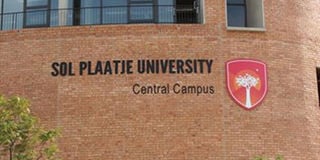SPU: University that is bucking the common trend

Vice-Chancellor of SPU, Prof Yunus Ballim, officially opened the very first Sol Plaatje University Creative Writing Summer School. The writers here will be expected to submit work in English or seTswana. PHOTO | COURTESY
What you need to know:
- The writers here will be expected to submit work in English or seTswana (the most spoken language in the Northern Cape) and two anthologies with work translated from seTswana to English and vice-versa.
- I have dreamt of this for a long time. A perfect way to allow writers to create in the language they are comfortable in and yet giving literary works a wider audience among the local and international reading audience. How cool is that?
During the December break while back in South Africa for the holidays, my partner and I decided on a spur of the moment, to take a trip to Kimberley in the Northern Cape Province. I sent a message to one of my writer friends Sabata Mpho Mokae, who stays in Kimberley to inform him that we were making our way to his town. Would he be able to find reasonably-priced accommodation for us and perhaps take us to Galeshewe Township to visit the home of former Robben Island prisoner and Pan-African Congress founder Robert Sobukwe?
My message to Sabata, who also heads the Creative Writing Programme at Sol Plaatje University, turned out to be an inspired move. When he picked us up at the taxi rank, he immediately enquired whether I had any plans for the second week of January. I told him I was free. Would I be averse to being one of the three facilitators for a writers’ workshop, he wanted to know. I readily agreed.
On the evening of Sunday the 8th, with university still left with a week’s vacation, the Vice-Chancellor of SPU, Prof Yunus Ballim, officially opened the very first Sol Plaatje University Creative Writing Summer School. The writers here will be expected to submit work in English or seTswana (the most spoken language in the Northern Cape) and two anthologies with work translated from seTswana to English and vice-versa. I have dreamt of this for a long time. A perfect way to allow writers to create in the language they are comfortable in and yet giving literary works a wider audience among the local and international reading audience. How cool is that?
SHORTLISTED WRITERS
On a continent where it appears Humanities Departments in universities seem in danger of being made redundant, Prof Ballim is a breath of fresh air. He is a strong supporter of holistic knowledge and even as SPU aims at being the leader in educating data scientists, he has a vision of SPU being the leading school in creative writing on the continent. A scientist by training (he is an engineer), Prof Ballim is also immensely well-read and I cannot remember when last I talked to someone who is not a writer who had me writing down so many titles to place on my to-read list.
And then there is more from this young university. In March last year, a day after the Etisalat Prize ceremony, I sat in a meeting with the board members of the Prize and the CEO and financial director of Etisalat. They wanted to know where they could improve. Someone suggested that a residency on the continent for one of the shortlisted writers would be ideal instead of just for the winner in the UK. I offered to do some research and contact some South African universities on this.
Two leading universities were willing to host a writer for a month’s residency but because of budgetary constraints, Etisalat would have to fly the writer in and pay the living expenses. I recounted this to Sabata and immediately he made an offer. They had been hoping to have a residency and this could be the thing.
It awaits Etisalat to do the paperwork but this little four-year-old university in a small mining city becomes the second university worldwide, after University of East Anglia, to see the importance of the only literary prize open to writers in English on the continent.
What did SPU put on the table? They offered a return flight, accommodation, free Wi-Fi, a month’s living expenses and script supervision. In exchange, all they ask for is a public reading and for Kimberley to be one of the three cities that Etisalat shortlistees visit on their book tour. Through Prof Ballim’s support, Sabata has managed to secure funding from the provincial government and other sources to ensure that the programme is exactly how they envision it.
The creative writing programme is still very much in its infancy but I suspect so long as Prof Ballim is here, it will take its place as a worthwhile addition to the African literary landscape. I couldn’t help but think of some brilliant yet frustrated Kenyan academics who would be more appreciated at Sol Plaatje University.
And over here in Kimberley?
Critically-acclaimed poet Lesego Rampolokeng, award-winning playwright and actor Moagi Modise and I are already planning what we will improve on when we facilitate the Creative Writing Summer School in January 2018. There is funding for the programme for at least the next three years, see?





